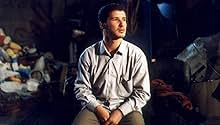Zir-e noor-e maah
- 2001
- 1 घं 36 मि
अपनी भाषा में प्लॉट जोड़ेंHassan is a student of Religious /Islamic school and is about to be dressed as a missioner .In such a time when his other mates are excited and are getting ready to be formally dressed and t... सभी पढ़ेंHassan is a student of Religious /Islamic school and is about to be dressed as a missioner .In such a time when his other mates are excited and are getting ready to be formally dressed and to become a spiritual missioner Hassan's doubts and incoherences starts and he begins to ha... सभी पढ़ेंHassan is a student of Religious /Islamic school and is about to be dressed as a missioner .In such a time when his other mates are excited and are getting ready to be formally dressed and to become a spiritual missioner Hassan's doubts and incoherences starts and he begins to have a struggle with himself. Therefore he postpones his ceremony, yet for the sake of his f... सभी पढ़ें
- पुरस्कार
- 7 जीत और कुल 2 नामांकन
फ़ीचर्ड समीक्षाएं
What is appealing about `Under the Moonlight' is how simply and un-didactically it describes its hero's transformation. Nobody ever has to explain anything. The style is as pure as anything in the Italian Neorealists. There are all sorts of echoes of quite wonderful films that this movie carries. The boy and the hero's connecting with him reminded me of the Brazilian Walter Salles' wonderful `Central do Brasil' (`Central Station,' 1998). The slightly half-witted `poet' under the bridge who wants to stop collecting garbage and go back to `breaking chains' recalls Anthony Quinn as Zampanò in Fellini's `La Strada,' (1954) and the hopeless crew who sometimes get stomach aches from found food suggests Kurosawa's grim but unforgettable `Dodesukaden' (1970). Mir-Karimi's under-the-bridge down-and-out scenes are a little overly theatrical, but certainly vivid.
`Under the Moonlight' relieves us from the pervasive Iranian sense of hopelessness by looking at evil and suffering the seminarian's relatively serene and poetic viewpoint and by leaving him spiritually transformed, but still able to do as he likes with his life. Even after a beating and sleeping on the floor of a mosque, Seyid is still pristine enough to show up for class, and this resilience and purity allow us, the audience, to look at the world's horrors through innocent and still hopeful eyes. `Under the Moonlight' doesn't try to be sophisticated what it aspires to, and nearly achieves, is a kind of wordless pensiveness -- and first time actor Hossein Parastar has nothing more complicated to show us than his big suffering eyes, which much of the time are rather blank. The exploratory, meditative, rueful feeling is wonderfully sustained for much of the film. Ultimately somehow, this pleasing, thoughtful story fails to leave quite the profound impression that it might because of weaknesses in construction.
In the penultimate shot, Seyid declares to this roommate that he isn't ready to become a priest yet, and the roommate berates him sorrowfully for this choice, then walks away before Seyid can answer. What does the final shot mean? We see Seyid's hand in a subway car, his arm draped in the shaykh's robe. It's ambiguous. Has he rushed in to the investiture ceremony his roommate told him he was missing? Or is he pretending to be a shaykh, while continuing with his exploration of the underside of Tehran city life? It's hard to end a movie with nothing but a hasty question mark. But I'm glad the theater took the chance of showing this unknown, unpublicized movie for a whole week. It shows that Iranian filmmakers are not such a hopeless, deterministic lot as I'd thought.
Ending may provide a bit too much closure, to an otherwise wonderfully open-ended point of view, but is satisfying nonetheless. Yet another great addition to a growing body of Iranian works which affirm the seventh art status of the medium.
क्या आपको पता है
- ट्रिवियाReza Mirkarimi's second film as a director.






